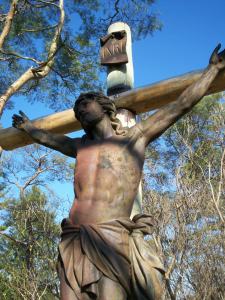When I was a young man, in my late teens or early 20’s, whenever I was facing some type of dilemma, my father would always expect me to ‘do the right thing’; whether it was job-hunting, school, following through on commitments at church or with family and friends, he would always tell me that he knew I would do the right thing….and he also would tell me that, upon reflection, I would just know what the ‘right thing to do’ was.
In the parable related in our passage from St. Matthews Gospel today, we hear of two sons; one who says he won’t do what his father asks, but later reconsiders and does it; and another son who says he’ll do the father’s bidding, but does not. The first son, it seems, was the one who ultimately ‘did the right thing.’
And the right thing, that Jesus is telling his listeners, is entering into the Kingdom of Heaven; that’s returning to union with God. It starts in the here and now. It’s what we were all created for; and it is something that we are all invited into. But it seems, as Jesus relates this parable to upstanding members of his community, a particular group of Pharisees, that entry is being made by people that the ‘community’ has written off as unclean and unworthy of the kingdom.
The reason Jesus says that tax collectors and prostitutes are getting into the kingdom of heaven ahead of the Pharisees is not because the Pharisees followed the law and the traditions of their faith. The reason that tax collectors and prostitutes would get into the kingdom ahead of this particular group of Pharisees, is because they were willing to be open to the movement of God within their hearts, and to change their ways and turn their hearts to God. When Jesus spoke of tax collectors and the like, he didn’t condone their behaviour or their lifestyles. He told them they had to change ; to the woman caught in the act of adultery he said, ‘Go and sin no more’. To his disciples he said if you are preparing to offer sacrifice and remember you are at odds with your brother or sister, go and make peace first, then offer your sacrifice. To Zaccheus , a tax collector, he said salvation had come to his house because he was changing his ways, letting love for God occupy his heart instead of material gain. Repent. Forgive. Love.
There was nothing inherently wrong with the law and the traditions that the Pharisees studied and upheld. The law, after all, was handed down to them through Moses, as a means of living in right relationship with God. But for some of them, the law was no longer a means of coming closer to God, but an end in itself. That was the problem.
It was observing the law for the sake of observing the law; some of them had apparently forgotten the heart of the law – and the heart of the law is compassion and mercy. But in observing the law for its sake alone, they had replaced God with another idol; the law had become an idol to them, and as such, it had taken on a life of its own, and rather than becoming a means of growing closer to God, it had become an obstacle.
The tax collectors and prostitutes and ‘public sinners’ on the other hand, had hit rock bottom, in terms of their relationship with God. The world was all important; God was not – how much like our own age does this sound? And Jesus continually called them to set aside their worldliness, their desires for worldly pleasures to the exclusion of God; their self-absorbed and self-destructive lifestyles; and turn back to God, recognizing that they had turned from Him. Many were willing to do just that; Jesus had not written them off as much of their own society had, but he did call them to repent and turn to God with broken and open hearts.
This group of Pharisees , on the other hand, blinded by their own pride, couldn’t see that everyone – Everyone – is on a constant journey in life, a journey where we are all invited to continually set aside the things that prevent us from being completely open to the work of God in and through our own lives. They were so caught up in their own self-righteousness that they couldn’t bear to consider that Jesus was inviting them to use their religious tradition and laws as a means of deepening their life in God.
That observance of law and tradition is something that we –Catholics- are often criticized for. The point in all of this is that we follow what the Church teaches, and participate in all manner of devotional and liturgical practices set out by the Church, not because we have to, but because we want to. We desire to deepen our relationship with God; and God, in the person of Jesus, has Himself given us the Sacraments and the Church, as the means through which we can open ourselves to receiving God into the very depths of our being. That’s what is so important about following the Church’s teaching. Not because we get a ‘gold star’ or try to out-do each other in keeping rules and having our own scorecards, or even ‘score points’ with God. It’s important because it provides us with the opportunities to open ourselves further to God’s saving action in our own lives, and enables us to reach out and share this action with others.
But it comes down to understanding that Sacred Scripture, Sacred Tradition and the Church’s teaching are a means through which God draws us to himself; but only if we remain open to that and place love of God above all else.
And whether we have come to that understanding, or are struggling with it, or are just becoming open to considering it; we are asked to be more like the first son in today’s parable; even if we haven’t immediately responded to God’s invitation to a deeper love, there is always time to reconsider and ‘do the right thing’. And the ‘right thing’, is to move back into union with our Creator, where we were meant to be, right from the beginning.
Praised be Jesus Christ, now and forever!




